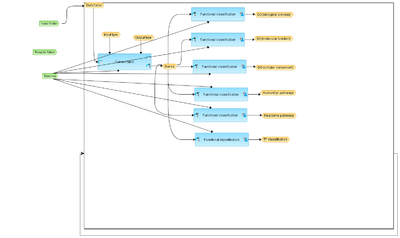Difference between revisions of "Mapping to ontologies for multiple gene sets (workflow)"
(Automatic synchronization with BioUML) |
(Automatic synchronization with BioUML) |
||
| (One intermediate revision by one user not shown) | |||
| Line 6: | Line 6: | ||
[[File:Mapping-to-ontologies-for-multiple-gene-sets-workflow-overview.png|400px]] | [[File:Mapping-to-ontologies-for-multiple-gene-sets-workflow-overview.png|400px]] | ||
== Description == | == Description == | ||
| − | This workflow | + | This workflow is designed to classify a multiple set of genes by enrichment analysis using GO, Reactome, HumanCyc and TF classification databases. Gene sets should be located in one folder At the first step, the input table is converted into a table with Ensembl Gene IDs. |
| − | + | This table with Ensembl Gene Ids is subjected to functional classification, which is done in parallel by the following ontologies: GO biological processes, GO cellular components, GO molecular functions, Reactome pathways, HumanCyc pathways, TF classification. | |
| − | + | For each ontological term several parameters are calculated, including expected number of hits, actual number of hits, p-value, as well as hit names and the link to the corresponding ontological term. | |
| − | The | + | The same steps are repeated for the next input table, and several cycles are performed automatically corresponding to the number of tables in the input folder. |
| − | + | ||
Latest revision as of 16:34, 12 March 2019
- Workflow title
- Mapping to ontologies for multiple gene sets
- Provider
- geneXplain GmbH
[edit] Workflow overview
[edit] Description
This workflow is designed to classify a multiple set of genes by enrichment analysis using GO, Reactome, HumanCyc and TF classification databases. Gene sets should be located in one folder At the first step, the input table is converted into a table with Ensembl Gene IDs.
This table with Ensembl Gene Ids is subjected to functional classification, which is done in parallel by the following ontologies: GO biological processes, GO cellular components, GO molecular functions, Reactome pathways, HumanCyc pathways, TF classification.
For each ontological term several parameters are calculated, including expected number of hits, actual number of hits, p-value, as well as hit names and the link to the corresponding ontological term.
The same steps are repeated for the next input table, and several cycles are performed automatically corresponding to the number of tables in the input folder.
[edit] Parameters
- Input folder
- Folder to get input tables from
- Species
- Results folder
- Folder to store results (will be created if not exists yet)
